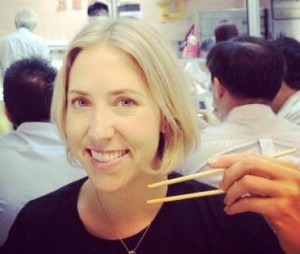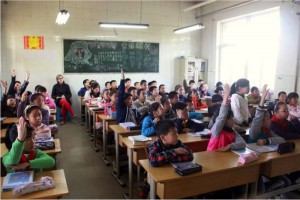I researched math achievement in Xi’an, China as part of the Fulbright U.S. Student Program, and I was in for a surprise. I discovered a student learning style that called into question the negative stereotypes Americans often have about ‘memorization’ in Asian countries. The use of test scores as a measure of human potential is a controversial topic in our national news. I was definitely curious how Chinese students ace their tests so easily. Maybe, I thought, classrooms in China really are like student factories, pumping out perfect calculators. I could not have been more wrong.
Since my grant ended in 2013, I have excitedly told everyone within earshot that math education in China is much more than the ‘test culture’ we often hear it is. In China, I found a culture of participation inside classrooms and I watched young children work through failure with courage and persistence. By all my tests of good learning, Chinese classrooms were performing well.
What was the secret to their success?
There is no secret at all. The teachers themselves had incredible fluency in mathematics and were trained to help children flexibly process the many ways to solve one single problem. Students were analyzing the problems to see which solution method would be the most efficient. Teacher background preparation made the in-class dialogues rich and smooth. Students, with their diverse learning styles and abilities, are the main beneficiaries of thoroughly prepared teachers.
What I learned in China allows me to contribute to our national conversation on education reform. Math competence, evidenced by student test scores, is a byproduct of a math fluency that every teacher in every school should cultivate. I visited classrooms and held teacher forums to dive deeper into the professional development and training programs that help Chinese teachers nurture math fluency. I was most impressed by the respect shown to teachers and the support given them during the week to prepare them and learn new pedagogical strategies from their peers.
Each of us has expectations that will be shattered during our time in country. In turn, we get to shatter expectations that our host communities have about American culture.
Just as the classroom benefits from good teacher preparation, so the Fulbright project is as good or as bad as your application preparation. My Fulbright project started long before I applied, as I developed my project topic in my junior and senior years of undergraduate studies. I read and wrote about Chinese economic development and education reforms, and produced essays on Chinese education for various classes in English, ethics and economics.
I benefited from telling my ideas and expectations to different audiences and hearing their feedback, not always positive. Everyone I spoke with had an opinion about the reasons for Chinese math test achievements. I learned valuable insights about American perceptions of China through the Fulbright project preparation.
By the time the application deadline came around, my project had been edited by nearly thirty academics from four or five unrelated disciplines. That was the fluency that I needed to be able to focus on cross-cultural exchange once I landed on the ground. My advice to any applicants is to start early and be as fluent as you can be in your subject, so that the application and, hopefully, time in country, is as easy as two plus two.



No Comments